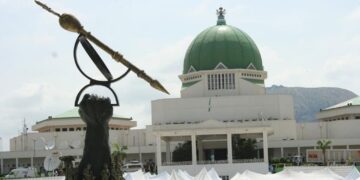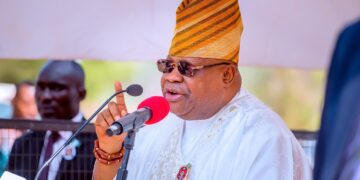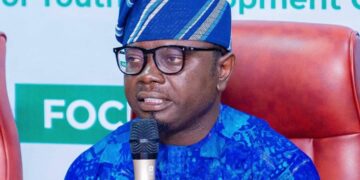_By Dr. Jimoh Olorede, PhD_
Tomorrow, Nigerians will cast their ballots to elect the next President of the most populous country in Africa, and the world’s sixth most-populous country. While there are several presidential contestants (eighteen in total number), there are only four real contenders, who have a chance of winning the election into the much covetous Nigerian presidency.
The four leading presidential candidates with some noticeable ‘Strengths, Weaknesses, Opportunities and Threats’ (SWOT), and of course, also with certain unique selling propositions are: Peter Obi of the Labour Party (LP), Rabiu Kwankwaso of the New Nigeria Peoples Party (NNPP), Atiku Abubakar of the Peoples Democratic Party (PDP), and Bola Tinubu of the All Progressives Congress (APC). Meanwhile, since inception of the present fourth republic in 1999, the PDP and the APC have been the two major opposition parties between which the presidency is being rotated in the last 23 years; the former (PDP) was in presidency between 1999 and 2015, and the latter (APC) has been in power from 2015 till date.
As the the presidential candidates showcase their strengths and opportunities, obviously, there are weaknesses and threats which may scuttle the fruition of their prospects of becoming the next president. The complexity of the Nigerian politics, given its intricacies, complicated machinations, conspiratorial intrigues, ethnic issues, corruption and other related derivatives, characterizes its nature. So, winning elections into Nigerian presidency is no child play at all! According to the Independent National Electoral Commission (INEC), the voter register had swollen up to 93.5 million. Also, with the addition of 56,872, the total number of polling units where ballots would be cast in the 774 local government areas across the 36 states of the federation and the FCT, Abuja, is now 176,974. Unarguably, wining presidential elections in Nigeria requires having a solid structure in the majority of the 774 local government areas of the federation that will ensure the presence and representation of a political party and its candidate in all the polling units where over 93.5 million registered voters would cast their ballots. Coupled with the structure, a presidential candidate must have some level of influence among some influential political stakeholders in this country, and a large clout of followership who would be of great help to his cause. In the SWOT analysis of the four leading presidential candidates, the contender with greatest strengths and opportunities, and of course, least weaknesses and threats, would emerge in this election as Nigerian next President.
Peter Obi: The presidential candidate of the Labour Party appears most popular amongst the Nigerian Youths. This is obviously Obi’s main area of strength given the fact that there are over 37 million registered youths on the INEC’s final Voter Register List. Another thing that would work for Obi, just as it may work for other candidates is what I refer to as ‘ethnic or regional chauvinism’, which is an undue partiality or attachment to a group to which one belongs. This would play out to be a strength for Peter Obi in the South-South and South-East geopolitical zones. However, this would be a great threat to the candidate of the Peoples Democratic Party, Atiku Abubakar, whose party is presently in control of seven states out of eleven (5 states in the South-South and 2 in the South-East) with a combined population of 16.83 million of registered voters out of 25.34 million of the total number of registered voters in the two geopolitical zones.
Notwithstanding the aforementioned strengths and opportunities, among many others, there are many instances that constitute weaknesses and threats against the candidate of the Labour Party, Peter Obi. According to INEC, Labour Party could only field 134,874 Polling Agents out of the expected 176,974. Also, the Party does not have a single incumbent governor out of the 36 states making up the federation; so, none is obviously openly working for him! Unless there’s a magic wand somewhere, there’s no way Peter Obi would record the majority of the votes cast across the 36 states to emerge president. At best, Obi would play spoiler role of a great magnitude, especially against Atiku of the PDP.
Rabiu Kwankwaso: The candidate of the New Nigeria Peoples Party (NNPP) is also a major contender in this election because of the voting strengths of the northern geopolitical zones, which record over 50.15 million number of registered voters, which is about 50 percent of the total population of eligible voters in this election; the North-West geopolitical zone records the largest number of registered eligible voters totaling 22.25 million, the North-Central has a total of 15.36 million while the North-East came up with 12.54 million.
As I said earlier, ‘ethnic cum tribal chauvinism’ would also be a sentiment of ‘positive outcome’ for Kwankwaso in the North. Surprisingly, according to INEC, Kwankwaso’s party was able to field 176,200 polling agents, who would monitor and protect the party’s votes in the election. Nevertheless, the party has many weaknesses and threats that would thwart its chance of winning this election. This party and its candidate are not really popular in the Southern region, and, of course, Kwankwaso would not win all the votes in the North. Similarly, Kwankwaso, just like Obi, would also be a spoiler in this election. NNPP would not only spoil PDP’s votes in the North, it would also wreck a havock for the APC.
Atiku Abubakar The candidate of the Peoples Democratic Party (PDP) has a good chance of winning this election. Presently, the party has 14 governors to its credit; one in the North-West, one in the North-Central, three in the North-East, five in the South-South, two in the South-East and two in the South-West, with a combined population of 33.94 million registered eligible voters. The party also has many Senators and Members of the National Assembly working for the success of its candidate. As a party that had ruled the country for many years (1999 to 2015), PDP has a solid structure across the federation. Showcasing this strength, for this election, the party, according to INEC, fields 176,588 Polling Agents, which is the highest among the numbers fielded by all the political parties.
Surely, many northerners would vote for Atiku whether they are members of the APC, any other political part(ies) or not. Based on ‘ethnic/tribal chauvinism’, some northerners want power to remain in the North regardless of whatever party the candidate belongs. After all, some believe they’re ‘born to rule’ with their guts premised on the strength of their overwhelming population. However, the peculiarity of this election transcends tribalism, ethnicity and even religion. One novel nature of politics that has also been manifesting among Nigerian politicians is that there’s no permanent enemy or friend in politics; what has always remained permanent is politicians’ interest; even where there are die-hard party loyalists, their interest remains sacrosanct to them! So, stakeholders in a particular party in which their interests reside would hardly jettison it for another party. For this reason and many others, the strength of the North in terms of its whopping population may not work in Atiku’s interest.
Again, there are many threats against Atiku’s prospect of becoming the next president of Nigeria. The two spoilers, Obi and Kwankwaso, for instance, would wreck the outcome for him; While the former would spoil Atiku’s votes in the South, especially in the South-South and South-East, the latter would do same of great magnitude to Atiku in the North. The inability of the PDP leadership to resolve the grievances of the G-5 Governors over the refusal of the National Chairman of the party, Dr. Iyorchia Ayu to relinquish his position to a Southerner would also be a setback against the success of the party at the polls.
Bola Tinubu: The presidential candidate of the ruling All Progressives Congress (APC) has many weaknesses and threats against his ambition. Unfortunately, many of these are intra-party based. Apart from personal weaknesses just like any other candidates, many of his weaknesses are in actual fact, attributable to the weaknesses of his party. Because people know Tinubu as the national leader of the ruling APC, they directly attribute whatever failure of the party to him and blame him for same, while they hardly attribute the success of the party to him, not even by the beneficiaries and stakeholders of the APC. Instead, they constitute a threat with their conspiracies capable of spoiling the votes for their own candidate. But for his ‘intra-party opposition’, Tinubu’s strengths and opportunities obviously outweigh his weaknesses and threats. Being a candidate of the ruling party, with the potency of its incumbency, should be a a great strength for Tinubu.
Moreso, APC controls 22 states including the Federal Capital Territory, Abuja, with a total population of 56.65 million registered eligible voters. In the three Northern geopolitical zones with records of the highest number of registered voters totaling over 50.15 million, the APC controls 15 out of 20 states with a total population of over 38.17 million of registered voters, leaving 11.98 million to the PDP, which controls only five states in the zones. According to INEC’s data, Lagos (with over 7 million), Kano (5.92 million), Kaduna (4.34 million) and Katsina (3.51 million) states take the lion’s share of the total number of registered voters in Nigeria for this year’s general elections. All of these states are under the influence and control of the ruling APC. It’s no gainsaying that Bola Tinubu has unrivaled political clout in these states. The Rivers State that’s next in this category has become a “no-go-area” for the PDP because of the unresolved rift with the governor of the state, Nyesome Wike. With these statistics-based facts, among others, there’s every likelyhood that Bola Tinubu of the ruling All Progressives Congress (APC) will emerge as President Buhari’s successor. Congratulations to Asiwaju Bola Tinubu in advance, as President and Commander In-Chief of the Nigerian Arm Forces!
Dr. Olorede, PhD, M.Sc., B.Sc., HND, dip Journ., MNIPR*, writes via [email protected]/08111841887.






